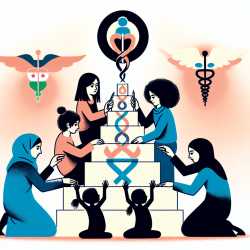The ongoing crisis in Syria has led to a significant displacement of its citizens, with neighboring Lebanon hosting over 1.5 million conflict-affected migrants. Among these migrants are adolescent girls who face unique challenges and vulnerabilities. A recent study titled "I don’t know if we’ll ever live in harmony" highlights the unmet needs of these girls and provides valuable insights for practitioners seeking to improve their skills and interventions.
Understanding the Unmet Needs
The study utilized a mixed-methods approach to explore the self-reported unmet needs of 188 Syrian adolescent girls who migrated to Lebanon between 2011 and 2016. Using Maslow's Hierarchy of Needs as a framework, the research identified various levels of unmet needs ranging from physiological to self-actualization.
- Physiological Needs: Many girls reported lacking basic necessities such as food, clean water, and adequate shelter.
- Safety Needs: Concerns about personal security, domestic violence, and lack of access to healthcare were prevalent.
- Belongingness and Love: Feelings of isolation and a lack of social support were common among the participants.
- Esteem Needs: Discrimination and limited educational opportunities affected the girls' self-esteem.
- Self-Actualization: Aspirations for education and personal growth were often hindered by their circumstances.
The Role of Practitioners
The findings from this study emphasize the need for practitioners to adopt a holistic approach when designing interventions for displaced populations. Here are some strategies that can be implemented:
- Create Safe Spaces: Establish environments where girls can socialize, learn, and express themselves without fear.
- Promote Educational Opportunities: Develop programs that provide accessible education and vocational training tailored to the needs of adolescent girls.
- Enhance Community Support: Foster community-based initiatives that encourage social integration and reduce discrimination.
- Address Basic Needs: Collaborate with local organizations to ensure access to essential resources such as food, water, and healthcare.
The Importance of Continued Research
This study serves as a foundation for further research into the specific needs of displaced adolescent girls. Practitioners are encouraged to explore additional areas such as mental health support, family dynamics, and long-term integration strategies. By staying informed through publications, conferences, and webinars, professionals can continuously refine their approaches to better serve this vulnerable population.
The journey towards meeting the needs of Syrian adolescent girls in Lebanon is ongoing. By implementing evidence-based interventions and remaining committed to understanding their unique challenges, practitioners can play a pivotal role in empowering these young individuals to thrive despite their circumstances.










